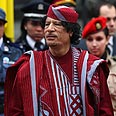
Libyan Jews shed no tears for Gaddafi
Community members who emigrated en masse to Jewish state are happy to reminisce and cling to their cultural heritage, but have no nostalgia for fallen leader. 'He committed the worst of crimes'
In Ramat Gan near Tel Aviv, a group of around 20 elderly punters, who all emigrated from Libya, are sitting around tables in the local Sports Cafe for their weekly get-together.
"It's the parliament of the Libya Jews," chuckles cafe owner Sergio Duyeb.
This community, which now numbers around 180,000 people, immigrated to the Jewish state in three stages: After the 1945 pogrom in Tripoli, in the wake of the unrest which accompanied Israel's creation in 1948, and following the Arab defeat during the 1967 Six-Day War.
While well integrated into Israeli society, many of them chat in Italian, a throwback to Libya's colonial past when the North African country was ruled by Italy between 1911 and 1943.
Sitting around the tables, the group suddenly breaks into song, then bursts out laughing as they belt out martial choruses from the Mussolini era.

Meir Kahalon at Museum of Libyan Jews (Photo: AFP)
"We will never forgive the Italian fascists for collaborating with the Third Reich," says Meir Sayegh, a 69-year-old survivor of the Giado concentration camp, some 150 miles (250 kilometers) south of Tripoli, where more than 500 Libyan Jews died from abuse and a typhoid epidemic in 1942.
"Nor will we forget the massacres of Jews carried out by the Muslims in Libya, let alone Gaddafi's abuses. He committed the worst of crimes by razing the graveyards where our grandparents were buried in order to build there," says Nashte Gilboa, the bitterness evident in his voice.
Gilboa, who owns a commercial vineyard in southern Israel, has fond memories of the era of King Idris I in the period after Libya gained its independence in 1951 and before Gaddafi's coup in 1969.
"Libya was a model of coexistence and tolerance," he says.
'Fully support the rebels'
He doesn't feel "even the slightest bit of nostalgia" watching the momentous events unfold in his former homeland over the past six months.
"I fully support the rebels, and I hope that one day we will see a free and democratic Libya," he told AFP, saying he would love to return to visit one day.
"I would like to be able to go back and find the place where my ancestors lived."
The Jewish community in Libya dates back to the third century BC and at its peak numbered around 38,000 people, although it was always the smallest of the Jewish populations in north Africa.
Most of the Jewish population left in the 20 years following World War II, although several hundred were still living there during Gaddafi's coup of 1969.
"When Gaddafi took power, one of his first acts was to chase the last 600 Jews out of the country and confiscate their property," explains Meir Kahalon, the 73-year-old president of the World Organization of Libyan Jews, which is based in Or Yehuda near Tel Aviv.
A passionate defender of the group's cultural identity, Kahalon publishes a glossy quarterly in Hebrew and Italian for the Libyan Jewish community, called "LivLuv".
He also runs an impressive museum which houses an archive and a research centre dedicated to preserving the history and heritage of Libya's Jewish community.
The museum tells the story of Libya of yesteryear, its rooms filled with dozens of pictures of rabbis, a Torah scroll dating back seven centuries, a replica of a typical Jewish home, a traditional horse-drawn carriage and even wall hangings woven with gold and scented with orange blossom.
But there is one more recent addition to the collection: inside a gold-embossed book is a page written in Arabic on May 20 of this year by Ahmed el-Sherif, a London-based Libyan opposition leader, in which he expresses his desire to see the Jews return to Libya.
Israel's own contribution to the Libyan revolution came from DJ Noy Alooshe, himself of Tunisian extraction.
He remixed a rambling Gaddafi speech into a dance music hit entitled "Zenga Zenga", which quickly went viral when it was posted on YouTube.
"This clip which now has some 30 Arabic versions, has already been seen by seven million people," Alooshe said. "It has somehow become the rallying cry for the Libyan revolution."
- Follow Ynetnews on Facebook










